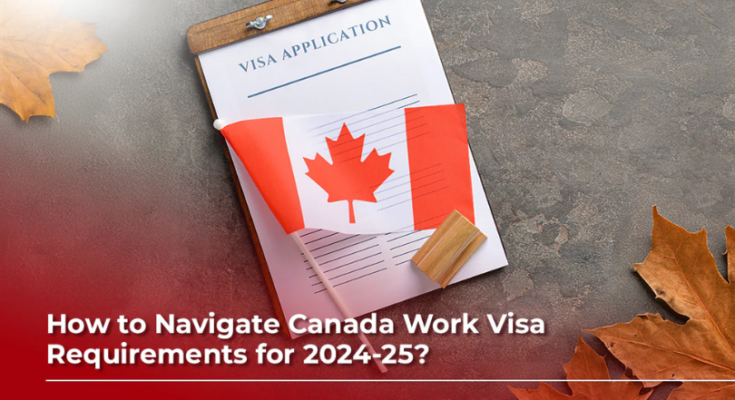Canada Work Visa Requirements: Canada is a top destination for individuals seeking employment opportunities and a better quality of life. If you’re considering moving to Canada for work, it’s essential to understand the various visa options available and the specific requirements for each. This guide will provide you with an in-depth overview of the work visa requirements for Canada.
Types of Canadian Work Visas
- Temporary Work Permit
- Permanent Work Visa
- Employer-Specific Work Permit
- Open Work Permit
Temporary Work Permit
A Temporary Work Permit allows individuals to work in Canada for a specific employer and duration. It is ideal for those who have a job offer from a Canadian employer.
Eligibility Requirements
- Job Offer: You must have a valid job offer from a Canadian employer.
- Labor Market Impact Assessment (LMIA): In most cases, the employer needs to obtain an LMIA, proving that hiring a foreign worker will not negatively impact the Canadian labor market.
- Proof of Qualifications: You must prove that you meet the job requirements, such as education, skills, and experience.
- Proof of Funds: You need to show that you have enough money to support yourself and any family members who come with you.
- Medical Exam: A medical examination may be required to ensure you are in good health.
- Police Clearance: You must provide a police clearance certificate from your home country.
Permanent Work Visa
A Permanent Work Visa allows individuals to live and work in Canada permanently. The most common route for obtaining a permanent work visa is through the Express Entry system, which includes:
- Federal Skilled Worker Program (FSWP)
- Federal Skilled Trades Program (FSTP)
- Canadian Experience Class (CEC)
Eligibility Requirements
- Work Experience: You must have at least one year of skilled work experience in a National Occupational Classification (NOC) skill type 0, A, or B.
- Language Proficiency: You need to demonstrate proficiency in English or French by taking an approved language test.
- Education: A Canadian educational credential or a foreign credential with an Educational Credential Assessment (ECA) is required.
- Proof of Funds: You must have sufficient funds to support yourself and your family in Canada.
- Medical Exam and Police Clearance: You need to pass a medical examination and provide a police clearance certificate.
Employer-Specific Work Permit
An Employer-Specific Work Permit is tied to a specific employer, job, and location. It is ideal for those who have a job offer from a Canadian employer who has obtained an LMIA.
Eligibility Requirements
- Job Offer: A valid job offer from a Canadian employer is mandatory.
- LMIA: The employer must have a positive LMIA.
- Qualifications: You must meet the job requirements.
- Proof of Funds: Adequate funds to support yourself and any accompanying family members.
- Medical Exam: A medical examination may be required.
- Police Clearance: A police clearance certificate may be necessary.
Open Work Permit
An Open Work Permit allows you to work for any employer in Canada, except for those employers who are listed as ineligible due to failing to comply with employment standards.
Eligibility Requirements
- No Job Offer Needed: You do not need a job offer to apply.
- Spouse/Common-Law Partner: If your spouse or common-law partner is a skilled worker or international student, you may be eligible.
- International Graduates: Graduates from Canadian post-secondary institutions may be eligible for a Post-Graduation Work Permit (PGWP).
- Refugees and Protected Persons: Individuals with refugee status or those who are protected persons may be eligible.
Application Process
- Determine Eligibility: Review the specific requirements for the type of work visa you are applying for.
- Gather Documents: Collect all necessary documents, including proof of qualifications, language test results, proof of funds, and any other required documentation.
- Submit Application: Complete and submit your application online or through a visa application center.
- Pay Fees: Pay the applicable visa processing fees.
- Biometrics: Provide biometrics (fingerprints and photo) if required.
- Attend Interview: You may be required to attend an interview at a Canadian consulate or embassy.
- Wait for Processing: Processing times vary, so be prepared to wait for a decision.
- Receive Visa: If approved, you will receive your work visa and can make travel arrangements to Canada.
Final Thoughts
Obtaining a work visa for Canada requires careful planning and attention to detail. Ensure that you meet all the eligibility requirements and provide accurate and complete information in your application. By following the guidelines outlined in this article, you can increase your chances of successfully obtaining a Canadian work visa and starting a new chapter in your professional life.



